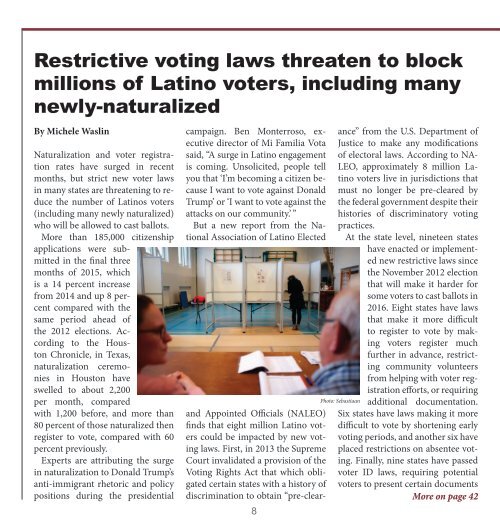GSN_May_FINAL_Yumpu
Create successful ePaper yourself
Turn your PDF publications into a flip-book with our unique Google optimized e-Paper software.
Restrictive voting laws threaten to block<br />
millions of Latino voters, including many<br />
newly-naturalized<br />
By Michele Waslin<br />
Naturalization and voter registration<br />
rates have surged in recent<br />
months, but strict new voter laws<br />
in many states are threatening to reduce<br />
the number of Latinos voters<br />
(including many newly naturalized)<br />
who will be allowed to cast ballots.<br />
More than 185,000 citizenship<br />
applications were submitted<br />
in the final three<br />
months of 2015, which<br />
is a 14 percent increase<br />
from 2014 and up 8 percent<br />
compared with the<br />
same period ahead of<br />
the 2012 elections. According<br />
to the Houston<br />
Chronicle, in Texas,<br />
naturalization ceremonies<br />
in Houston have<br />
swelled to about 2,200<br />
per month, compared<br />
with 1,200 before, and more than<br />
80 percent of those naturalized then<br />
register to vote, compared with 60<br />
percent previously.<br />
Experts are attributing the surge<br />
in naturalization to Donald Trump’s<br />
anti-immigrant rhetoric and policy<br />
positions during the presidential<br />
campaign. Ben Monterroso, executive<br />
director of Mi Familia Vota<br />
said, “A surge in Latino engagement<br />
is coming. Unsolicited, people tell<br />
you that ‘I’m becoming a citizen because<br />
I want to vote against Donald<br />
Trump’ or ‘I want to vote against the<br />
attacks on our community.’ ”<br />
But a new report from the National<br />
Association of Latino Elected<br />
8<br />
and Appointed Officials (NALEO)<br />
finds that eight million Latino voters<br />
could be impacted by new voting<br />
laws. First, in 2013 the Supreme<br />
Court invalidated a provision of the<br />
Voting Rights Act that which obligated<br />
certain states with a history of<br />
discrimination to obtain “pre-clearance”<br />
from the U.S. Department of<br />
Justice to make any modifications<br />
of electoral laws. According to NA-<br />
LEO, approximately 8 million Latino<br />
voters live in jurisdictions that<br />
must no longer be pre-cleared by<br />
the federal government despite their<br />
histories of discriminatory voting<br />
practices.<br />
At the state level, nineteen states<br />
have enacted or implemented<br />
new restrictive laws since<br />
the November 2012 election<br />
that will make it harder for<br />
some voters to cast ballots in<br />
2016. Eight states have laws<br />
that make it more difficult<br />
to register to vote by making<br />
voters register much<br />
further in advance, restricting<br />
community volunteers<br />
from helping with voter registration<br />
efforts, or requiring<br />
additional documentation.<br />
Six states have laws making it more<br />
difficult to vote by shortening early<br />
voting periods, and another six have<br />
placed restrictions on absentee voting.<br />
Finally, nine states have passed<br />
voter ID laws, requiring potential<br />
voters to present certain documents<br />
More on page 42<br />
Photo: Sebastiaan


